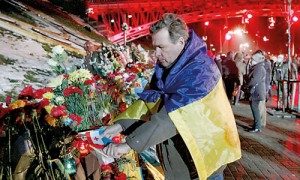Sunday Times 2
West looks impotent as Ukraine ceasefire frays
View(s):PARIS, Feb 21 (AFP) -The continued fighting in eastern Ukraine has made a mockery of the West’s latest attempts to negotiate a ceasefire but may ultimately pave the way for a more durable peace, say analysts.
It did not take long for the latest truce, brokered by France and Germany and signed in the Belarussian capital Minsk last week, to look as impotent as previous deals.

People attend a memorial rally to commemorate people from the so-called “Heavenly Sotnya” (Hundred) who were killed in anti-government protests in 2014, at Independence Square in Kiev February 20. Ukraine marked the first anniversary of pro-Moscow president Viktor Yanukovich's overthrow and the killings of 100 people protesting against his policy swerve away from Europe back to the old master, Russia (REUTERS)
With barely a pause, pro-Russian rebels continued their assault on the key transport hub of Debaltseve, ultimately forcing the Ukrainian military into a humiliating retreat.
“It was a classic case of good intentions paving the way to hell,” said Ievgen Vorobiov of the Polish Institute of International Affairs. “(German Chancellor Angela) Merkel saw the situation was deteriorating fast and that the United States was talking about supplying arms and escalating the conflict, and felt she needed to act.
“But she didn’t have a Plan B if the ceasefire failed, and she had nothing to enforce it — neither military power nor more sanctions.” The West has struggled to formulate a response to the continued fighting.
Merkel and French President Francois Hollande emerged from a meeting in Paris on Friday offering nothing but further calls for the truce to be respected.
The price of peace?
Russian President Vladimir Putin continues to deny he is directly backing the rebels, even as NATO remains adamant that his special forces, artillery and air defence units are still very much active in Ukraine.
But some analysts argue the battle for Debaltseve was inevitable, with the rebels clearly seeking more territory and resources to make a viable mini-state out of their fiefdom in the east. It also had symbolic importance, having been a key focus of military campaigns during the 19th and 20th centuries.
France and Germany may have decided to accept the fall of Debaltseve as the price for peace, said Jorg Forbrig of the German Marshall Fund of the United States, a think tank.
“They are not naive. Perhaps they think now this question is in a sense settled, it could contribute to a more durable ceasefire,” he said.
The question is whether the rebels will now pressure other areas, notably the port city of Mariupol.
But Balazs Jarabik, of the Carnegie Endowment for International Peace, said the rebels may be reluctant to attack a million-strong city of mostly Russian speakers.
“The more bloody the rebel advance, the more it proves right those who say Russia must be stopped,” said Jarabik.
“Putin has already achieved his main goals — he’s taken Crimea, he has a frozen conflict in the east. Now he needs the fighting to stop so that the international pressure on him falls.” Russia has encouraged “frozen conflicts” elsewhere in its neighbourhood, for instance in Georgia and Moldova where it has fuelled separatist movements just enough to keep the countries unstable and make them unattractive partners for the West.

